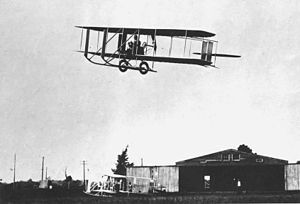Wright Model E
| Wright Model E | |
|---|---|

| |
| Wright Model E, over Simms Station near Dayton, Ohio, 1913 | |
| Role | Biplane |
| National origin | United States of America |
| Manufacturer | Wright Company |
| Designer | Wright brothers |
| First flight | 1913 |
| Number built | 1 |
The Wright Model E was the first in the series of Wright Flyers that used a single propeller[1] The aircraft was also the test demonstrator for the first automatic pilot control.
Design[]
The Model E featured 24 inch tires. It was flown with four and six cylinder Wright engines.
The model E was fitted with a prototype autopilot that used a wind driven generator and pendulums to drive the wing warping controls. The design was quickly eclipsed by a gyroscopic autopilot developed by Lawrence Sperry for the competing Curtiss Aeroplane Company.[2]
Operational history[]
On 31 December 1913, Orville Wright demonstrated a Model E with an "automatic stabilizer" flying seven circuits around Huffman Prairie field with his hands above his head.[3] The Model E demonstrations earned the Wright Brothers the 1913 Collier Trophy from Aero Club of America.
Albert Elton (1881–1975) purchased the sole Wright Model E for exhibition flights.[4]
Specifications (Wright Model E)[]
General characteristics
- Crew: one
- Length: 27 ft 9 in (8.46 m)
- Wingspan: 32 ft (9.8 m)
- Wing area: 316 sq ft (29.4 m2)
- Empty weight: 730 lb (331 kg)
- Powerplant: 1 × aircraft engine
- Propellers: 2-bladed fixed pitch, 7 ft (2.1 m) diameter
References[]
| Wikimedia Commons has media related to Wright Model E. |
- ^ "1913 Wright Model E". Retrieved 3 Feb 2011.
- ^ Tom D. Crouch. The Bishop's boys: a life of Wilbur and Orville Wright.
- ^ "Wright Automatic Stabilizer". New York Times. 6 January 1914.
- ^ American Aviation Historical Society. American Aviation Historical Society Journal. 9–11.
{{cite journal}}: Missing or empty|title=(help)
- 1910s United States sport aircraft
- Wright aircraft
- Biplanes
- Aircraft first flown in 1913
- Single-engined pusher aircraft